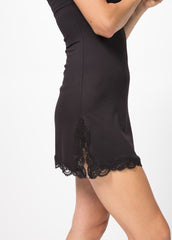We remember the controversial feminist icon and reflect on how far we've come...and how far we've yet to go.

Helen Gurley Brown famously said, “Good girls go to heaven. Bad girls go everywhere.”
Originally from Arkansas, Brown moved to Los Angeles with her mother and sister in the late 1930s. HGB (as she’d go on to pen) worked her way through the ranks as a single woman living in California, taking 17 different secretary jobs before proving herself as a highly adept writer. In total Mad Men fashion, by the early 1960s she was the West Coast’s most sought-after and highest-paid female advertising copywriter.
In 1959 Helen Gurley became Helen Gurley Brown when she married film producer David Brown (Driving Miss Daisy, Jaws). David encouraged her as a writer, culminating in her best-selling book Sex and the Single Girl. A handbook of sorts for young women seeking sexual freedom and personal independence, HGB documented her exploits as a bachelorette and provided both sex and lifestyle advice to a voracious audience. She was certainly one of the first to suggest, “Perhaps you will reconsider the idea that sex without marriage is dirty.”
Having made a name for herself, she was named editor-in-chief of the then struggling Cosmopolitan magazine in 1965. Brown turned the publication around, cultivating the sometimes salacious content that Cosmo is still known for today. She served as editor until 1999, an impressive 34-year career in which she encouraged women to have it all, “love, sex, and money.”
Helen Gurley Brown passed away in 2012 at the age of 90.

Many have questioned Brown’s position as a feminist over the years, saying that she and Cosmo promoted sexual freedom as a way of snagging a man, not freedom for freedom’s sake. We’d argue, however, that feminism is a spectrum that upholds women’s independence, equality, and autonomy over their own bodies. Brown supported women’s rights to pursue careers and personal pleasure, just like men. She gave women space and a platform to talk about their sexual experiences without judgment or criticism—and most importantly, she did so at a time when those topics were especially taboo.
In the editor’s note of an April 1976 issue of Cosmopolitan, Brown quoted then Simon & Schuster editor Michael Korda saying that “when it comes to business, women are still fairly ignorant about the uses and function of power, simply because they haven’t had much practice at it. They still earn less money, have to fight harder to get promoted, and above all, they’re often not taken seriously.” Forty years later, women may have had more practice at power, but much of the rest still remains.
At Baby & Company we’re still fighting Brown’s good fight, and we look forward to a future where everyone is treated with equality, respect, and self-actualization, as well as the freedom to pursue your pleasures everywhere from the bedroom to the boardroom.
Shop some of our favorite self-indulgences, below:



Only Hearts Delicious Chemise, $69 on sale
Van der Pop Ceramic Container: Party, $29-$39
Laura Urbinati Silk Slipdress, $388


Thanks, Tatyana! So glad you liked the piece. And good point about Cosmo helping to educate women about their bodies…what a great resource!
Wonderful piece. Like many people my age (50s), Cosmo was a stand-in for the Sex Ed our parents weren’t up for providing. Thanks for this!